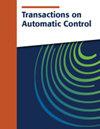网络中目标控制与估计的可控性与可观测性对偶性
IF 7
1区 计算机科学
Q1 AUTOMATION & CONTROL SYSTEMS
引用次数: 0
摘要
输出可控性和功能可观察性是能够分别控制和估计部分状态向量的属性。这些概念在高维系统的应用中是至关重要的,例如大型网络,其中只有变量(节点)的目标子集需要控制或估计。虽然全态可控性和可观测性之间的对偶性已经建立,但它们的广义对偶性的表征仍然是一个突出的问题。在此,我们建立了输出可控性和函数可观测性之间的弱对偶性和强对偶性。具体地说,我们证明了系统的泛函可观测性意味着对偶系统的输出可控性(弱对偶),并且在一定的几何条件下,反之成立(强对偶)。作为强对偶性的一个应用,我们得到了通过静态反馈控制目标的充分必要条件。这使我们能够在闭环系统的目标控制器设计和功能观测器设计之间建立分离原则。这些结果推广了现代控制理论中的经典对偶原理和分离原理。本文章由计算机程序翻译,如有差异,请以英文原文为准。
Duality Between Controllability and Observability for Target Control and Estimation in Networks
Output controllability and functional observability are properties that enable, respectively, the control and estimation of part of the state vector. These notions are of utmost importance in applications to high-dimensional systems, such as large-scale networks, in which only a target subset of variables (nodes) is sought to be controlled or estimated. Although the duality between full-state controllability and observability is well established, the characterization of the duality between their generalized counterparts remains an outstanding problem. Here, we establish both the weak and the strong duality between output controllability and functional observability. Specifically, we show that functional observability of a system implies output controllability of a dual system (weak duality), and that under a certain geometric condition the converse holds (strong duality). As an application of the strong duality, we derive a necessary and sufficient condition for target control via static feedback. This allow us to establish a separation principle between the design of target controllers and the design of functional observers in closed-loop systems. These results generalize the classical duality and separation principles in modern control theory.
求助全文
通过发布文献求助,成功后即可免费获取论文全文。
去求助
来源期刊

IEEE Transactions on Automatic Control
工程技术-工程:电子与电气
CiteScore
11.30
自引率
5.90%
发文量
824
审稿时长
9 months
期刊介绍:
In the IEEE Transactions on Automatic Control, the IEEE Control Systems Society publishes high-quality papers on the theory, design, and applications of control engineering. Two types of contributions are regularly considered:
1) Papers: Presentation of significant research, development, or application of control concepts.
2) Technical Notes and Correspondence: Brief technical notes, comments on published areas or established control topics, corrections to papers and notes published in the Transactions.
In addition, special papers (tutorials, surveys, and perspectives on the theory and applications of control systems topics) are solicited.
 求助内容:
求助内容: 应助结果提醒方式:
应助结果提醒方式:


